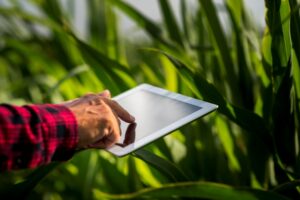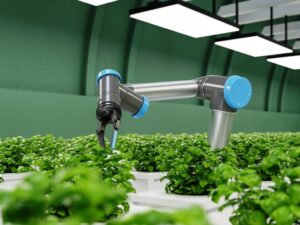AI technologies have been implemented as a part of digital farming technology to yield better and healthier crops, reduce workloads, organize data, and improve a wide array of tasks in the agricultural industry. The agricultural industry seeks ways to maximize efficiency by turning to AI technologies. Here are some examples of the applications of AI in digital farming technologies.
IoT-Powered Digital Analytics
There is no denying that the volume of data collected through digital farming technologies like farm machinery, drone imagery, and crop analytics is so abundant that it can be challenging for humans to process. Therefore, it is quite natural for farmers and agricultural technology workers to turn to AI for help in analyzing data points.
With the implementation of agricultural AI, farmers can analyze the weather conditions, water usage, temperature, and soil conditions collected from the farm to make informed decisions on business choices. This includes determining the most feasible crop choices for a year or which hybrid seeds will decrease waste. Big data analysis also helps determine the optimized irrigation and reduces greenhouse emissions. It pinpoints the areas where light, water, and fertilizer are needed for better yield.
Additionally, AI-powered technologies in digital farming solutions like ground data, deep learning algorithms, and computer vision can process data captured from drones. AI combined with unmanned aircraft systems and drones can capture images of the complete farm and analyze them in real-time. Therefore, it is easier to monitor and analyze soil health and the condition of crops across the entire farm. AI-powered digital farming technology also helps to identify problem areas.

Predictive Analytics & Precise Farming
Precision agriculture is using AI systems to improve harvest quality and accuracy. It uses AI to detect diseases in plants, pests, and poor plant nutrition. AI sensors can detect the weeds and target them while choosing which herbicide to apply in the right buffer – preventing the overapplication of herbicides.
Farmers are using precision farming to improve agricultural accuracy using probabilistic models for seasonal forecasting. These models have the capability to look months ahead and use the data collected to offer farmers with base predictions for the most suitable crop varieties for a specific season. Also, it shares the ideal time for planting and the best locations. AI-powered digital farming technologies help to optimize farm management strategies by basing the decisions on the predicted weather patterns during the coming season.
Risk Management
Risk management – a crucial part of precision forecasting, is the backbone of an agricultural AI tool. Machine learning and AI are wonderful tools to reduce errors in business processes. The farmers can take advantage of forecasting and predictive analysis to reduce the risk of crop failure. To grow a sustainable crop in mass quantities requires a farmer to take enormous financial risks that depends on agricultural yield estimates for fulfilling supply chain orders.
The climate and weather conditions can only be predicted to a small degree. There are numerous other variables that can be controlled on the farms. These include plant strain, plant population, irrigation, pest control, and soil preparation. All of these are managed by harvesting IoT data to populate predictive algorithms that help in making decisions for the year’s harvest.
Risk management offerings and algorithms are used for determining economic trends, supply chain management, and commodity prices, if a farmer uses government insurance and minimum yield requirements.
Pest Control
Pest control is one of the most important elements of farming and increasing crop yield. A lot of pest control companies use AI to automate and improve functions, starting from pesticide route planning to spray times and pest prediction. Using drone technology, a crucial element of digital farming technology, agricultural farmers and pest control companies can understand the details of every crop and pest. Full-time monitoring helps determine crop degradation, disease spots, pests, and unhealthy soil types. A farmer can collect data from a specific crop area, thus stopping the spread of the disease.
AI-Powered Digital Farming Technology Has Solved Labor Issues

Traditionally, a farm has needed many workers to produce and harvest crops. However, today’s farmers are seeing a labor shortage for workers as not many people want to enter the farming profession because of the intense physical labor and high turnover rate. As a result, most agricultural efforts use mobile & migrant labor workforce to help fill those gaps, which can create a challenge for a stable work environment.
AI-powered digital farming solutions have solved the critical farm labor challenges by automating tasks and increasing efficiencies and capacities for the short-handed workers. Autonomous equipment can help harvest crops at a higher volume and quicker pace than human laborers. New autonomous technology can identify and eliminate weeds more accurately, thus reducing cost and risk. AI-powered digital farming technology brings a permanent solution for the fluctuating and unpredictable agricultural workforce.
Smart tractors use data insights to remotely plant seeds in the best possible way. Predictive analytics data is remotely applied to the machines. After the seeds are planted, the IoT devices continue to monitor growth, weeds, water and soil retention, and additional factors that, in turn, inform next year’s crop. Instead of depending on human measurements and labor, automated irrigation and food systems ensure that the crops have proper nutrients.
Farmers can also take advantage of chatbots to seek advice and recommendations on different problems. Chatbots are already used in different industries with great success. Therefore, it is not a surprise that AI-powered chatbots must help farmers as well. Agricultural AI and cognitive technologies enable farms across the world to run much more efficiently and offer the fundamental staples of dietary lifestyles. With the increasing global population size, farmers have to produce more food for a growing community. AI-powered digital farming technology can offer excellent assistance. Want to know more about how AI can be used in digital farming technology? Then, contact SoilOptix® today! Visit https://soiloptix.com/ for details!
